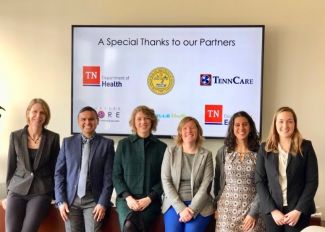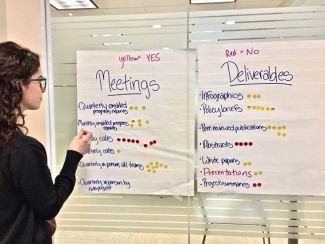How We Crafted a Child-Focused Policy Research Agenda in Tennessee
|
In fall 2018, we launched a new Policies for Action Research Hub at Vanderbilt to examine barriers to the healthy development and success of low-income children in Tennessee. We knew that building a strong, policy-focused research agenda would require open communication and a cooperative spirit among our state agencies and community health and education organizations.
Building on the RWJF Culture of Health Framework and community-academic partnership models, we convened partners from the Departments of Education and Health, TennCare, Tennessee SCORE, Nashville Health, and more, to develop a common vision for the Hub and conceptualize research questions that could inform state policies and programs.
What do policymakers need to know?

|
|
Project team members (Left to right: Carolyn Heinrich, Gilbert Gonzales, Melinda Buntin, Erin O’Hara, Monica Hernandez and Sarah Clark Henderson) |
While research projects often begin with very defined research questions, our team wanted to incorporate input from state partners before determining which specific questions within our areas of focus were most important. Before our proposal was submitted, we garnered support on a set of preliminary topic areas from stakeholders, and after the grant was awarded, we met individually with key stakeholders to gain additional insight. This resulted in adding adverse childhood experiences (ACES) as an area of focus.
We opened our kick-off stakeholder meeting in November with a level-setting presentation describing the current rates of children exposed to opioids, children with adverse childhood experiences, and barriers faced by children of immigrant parents in Tennessee. Three groups of attendees then brainstormed and developed research questions about each of the topic areas.
This collaborative process allowed participants to share their diverse sets of experience and to identify commonalities between policy and research goals. Participants also discussed relevant datasets owned by their organizations, and methods for linking that data in meaningful ways to pursue shared research objectives.

|
Sticky note voting acted as a meeting “exit ticket,” and allowed each partner to share preferences about project communication and deliverables. Researchers tend to publish information through academic journals, but policymakers and state agencies often prefer solution-oriented, timely products. Deliverables that scored highly on this exercise included infographics and policy briefs, which have the potential to reach a broad audience.
Refining our research agenda
Throughout this meeting, it became more and more clear that many of the most pressing issues facing Tennessee families have only been examined through a single sector or lens. This underscored the urgency to develop a comprehensive dataset that includes both health and education data. Only through a more whole-person, cross-sector framework can we best evaluate the policy levers, risk factors, and outcome measures that can lead to improvements for vulnerable Tennessee families.
In a follow-up meeting, project partners voted on the Hub’s most important and feasible research questions. The following questions were prioritized among a set of eight:
- What are the educational outcomes of children who have been diagnosed with neonatal abstinence syndrome or who have been exposed to opioids in utero?
- What are the predictors of health care access (e.g. federal and state policies, access to public services, insurance status, eligibility, payment systems, etc.) among children with immigrant parents?
Our role as a trusted partner
While these meetings deepened our partnerships across the state and helped us craft a robust policy-focused research agenda, it’s important to remember that many of these relationships were formed before the project even began. Our team has continuously worked to cultivate relationships by providing nonpartisan support to local and state leaders through research and education efforts. We have testified during state legislative hearings, made phone calls to share policy-oriented research findings, and engaged in regular co-learning meetings and networking opportunities.
We are hopeful our partnership approach will allow us to deepen connections across Tennessee, ultimately leading to actionable research products and findings that can boost the health, stability, and well-being of our most important asset: children.
Related Projects
-
September 28, 2016
|Has Evidence
| -
Mental and Behavioral HealthCalifornia Diversion: Mental Health, Racial Equity, and Criminal Court
December 14, 2021
|Has Evidence
| -
Community Justice and Public SafetyAre Cities and Counties Ready to Use Racial Equity Tools to Influence Policy?
January 14, 2019
|